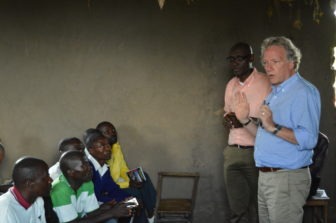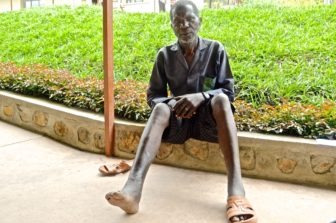Apr 16, 2015
By: Warren Lancaster, Senior Vice President, Programs
I have recently returned from Idjwi Island in Lake Kivu, South Kivu Province, Democratic Republic of Congo (DRC). Why the geographic detail? Because if you are like me, you may have never heard of Idjwi Island.
Idjwi is spectacularly beautiful sitting in the middle of this stunning lake, making it the perfect location for a film festival (like in Cannes).
But it is an island of contrasts with its location and its beauty. It is an island of tranquility in an ocean of conflict in the region. But its beauty to the visitor belies its material poverty where many children are under nourished and even malnourished. For example, 150 children a day are receiving supplementary feeding to return them to health in the small hospital on the north of the island.
I actually did not go for a film festival, but I went to investigate parasites, intestinal worms to be precise, hosted by Amani Global Works. In 2014 the END Fund financially supported a national survey of the DRC to discover the level of presence of NTDs. The survey revealed that on Idjwi almost everyone is infected. Prevalence this high means that children’s long-term education, development and even prospects for further work are negatively affected. For adults, although they are more acclimated to infection, it causes loss in productivity, which in turn negatively impacts family prosperity.
The END Fund is assessing Idjwi for possible support of an integrated NTD project that would treat the population for intestinal worms twice a year for the next three years.
But Idjwi has two other NTDs: lymphatic filariasis (LF) and schistosomiasis. They are at lower prevalence levels, but require treatments which could be bundled with intestinal worms treatment in the twice-yearly campaigns.
Unfortunately, without treatment already in place for LF, many people on the island are now suffering from advanced cases of elephantiasis in their lower limbs, which requires special care. Community health workers would be trained in limb care that alleviates the debilitating symptoms.
We met the King of North Idjwi, who is also the island’s government administrator. He was very excited and enthusiastic about the proposed treatment program but he wisely asked what we intended to do about the underlying causes. It is a brave person who does not listen to a King and we have taken his admonition to heart.
In discussions with village chiefs, the community is ready to work to increase the use of latrines, which means less open defecation to transfer worms from one person to another. The proposed program would also support initiatives to encourage all families to ‘sleep safe’ under a bed net because this has been proven to break the transmission of LF carried by mosquitos.
Back to the Royal Idjwi Film Festival. As well as the program assessment team we also took a two-person team of filmmakers to document the possibility of the Idjwi journey to become an NTD free zone. As we sat together in the evening watching the sun set and a beautiful moonrise and discussed how we could draw attention to this picturesque but forgotten island – the idea of the fictitious Royal Idjwi Film Festival was born. My question to you is, now that you’ve read to the bottom of this, wouldn’t you want to attend?


